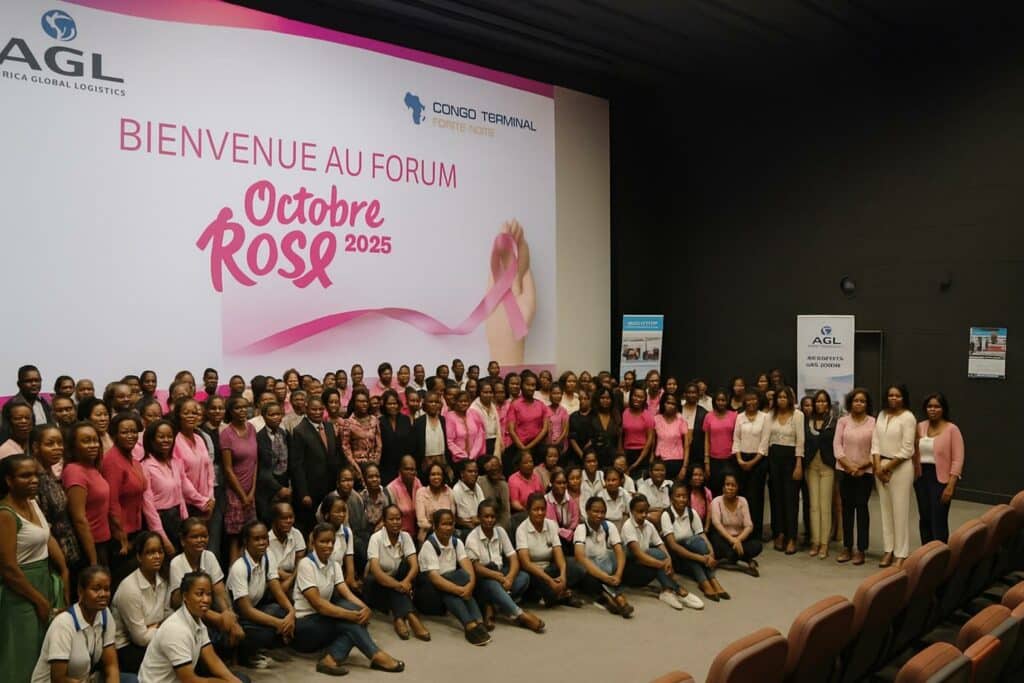A generation summoned to vigilance
The lecture hall of the École de Commerce et d’Industrie du Congo was unusually hushed when, on 23 October 2025, almost 250 young women from six higher-education institutions sat down to confront a pathology too often whispered about only in private. The joint initiative of Africa Global Logistics (AGL) Congo and its subsidiary Congo Terminal transformed the annual Pink October campaign into a fully fledged pedagogical experience, tailored to the linguistic, cultural and scientific expectations of students eager to master their own health destinies (Journal de Brazza).
By deliberately targeting the 18-to-25 age bracket, the organisers sought to plant preventive reflexes long before the statistical peak of incidence. According to the World Health Organization, breast cancer remains the leading cause of cancer mortality among African women, while cervical cancer still claims more than 70 000 lives every year on the continent. In the Republic of Congo, official registries are fragmentary, yet the Ministry of Health concedes that late diagnosis continues to inflate lethality rates. In such a landscape, every conversation on self-examination or HPV vaccination amounts to a public-health intervention in its own right.
Science translated into everyday practice
Gynaecologist Nzikou Boussoukou began with the biomedical fundamentals: anatomical risk zones, genetic predispositions, and the algorithm that guides clinicians from palpation to histopathology. General practitioner Jennifer Mavoungou then deconstructed persistent myths—”cancer equals amputation” or “a painless lump is harmless”—that discourage timely consultation. Their tandem approach illustrated a broader pedagogical philosophy: rigorous science, expressed in accessible French, underpinned by visual aids that were later shared on student networks.
The most striking moment, however, unfolded when midwife Damil Kinguedi invited volunteers to practise self-palpation on a medical mannequin fitted with silicone nodules of varying consistency. Nervous laughter gradually gave way to concentrated silence; by the session’s end, dozens of participants could replicate the circular, radial and vertical techniques recommended by oncological societies worldwide. “This is not an abstract exercise,” Kinguedi reminded her audience, “but a dialogue with your future self.”
Corporate citizenship at the port of Pointe-Noire
AGL Congo and Congo Terminal did not merely finance an awareness day; they embedded the programme inside a wider corporate-social-responsibility strategy that already includes scholarships, internships and malaria screenings for dockworkers’ families. Mayrise Manienze-Mbongo, head of human-capital development at Congo Terminal, framed the endeavour as a strategic investment: “Ignorance and silence are deadlier than any malignant tumour. Empowering these students today safeguards entire households tomorrow.”
The port operators also liaised with the regional health directorate to ensure that screening vouchers distributed during the conference could be redeemed at accredited laboratories without bureaucratic delays. Such coordination exemplifies the emerging public-private synergies encouraged by the National Development Plan 2022-2026, which calls on enterprises to co-finance preventive medicine in educational settings.
Breaking the wall of silence
Technical information alone rarely suffices to modify behaviour. The organisers therefore ceded the floor to relatives of patients lost to breast or cervical cancer. Each testimony, delivered in a measured tone, dismantled the argument that youth provides immunity. Tears were shed, yet the atmosphere resisted resignation; collective resilience surfaced in whispered pledges to schedule a first mammography or to discuss HPV vaccination with parents.
Sociologists note that Central African cultures sometimes equate gynaecological pathology with moral stigma, fuelling secrecy and late-stage presentation. By convening students across faculties—management, engineering, digital sciences—the Pink October event disrupted those silos, turning a personal health issue into a shared civic concern.
À retenir
Three elements crystallise the Pointe-Noire experience: early-age sensitisation multiplies the dividends of prevention; technical demonstrations such as self-palpation workshops convert abstract risk into concrete action; and corporate-public partnerships can accelerate access to diagnostic services without overburdening state budgets.
Le point juridique/éco
Congo’s legislative arsenal on oncology is still embryonic. A draft bill on cancer control, pending before the National Assembly, aims to establish a population-based registry and to subsidise screening for vulnerable groups. Should the text be adopted, companies that finance certified awareness campaigns may obtain tax credits proportional to their expenses, a mechanism inspired by the French Charte de la Responsabilité Sociétale des Entreprises.
Economically, the cost-effectiveness of early detection is compelling: a stage-I breast-cancer case treated locally averages 1.5 million CFA francs, whereas metastatic disease can exceed 15 million, not counting productivity losses. For the port community that anchors Pointe-Noire’s GDP contribution, shaving even a fraction off morbidity curves translates into measurable gains in workforce stability and insurance premiums.

